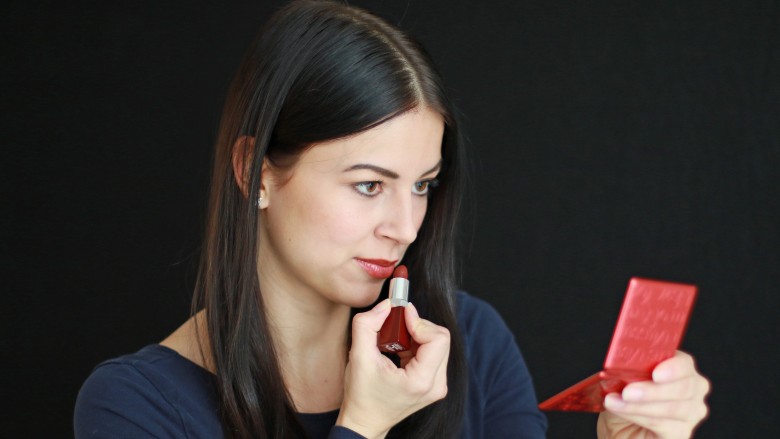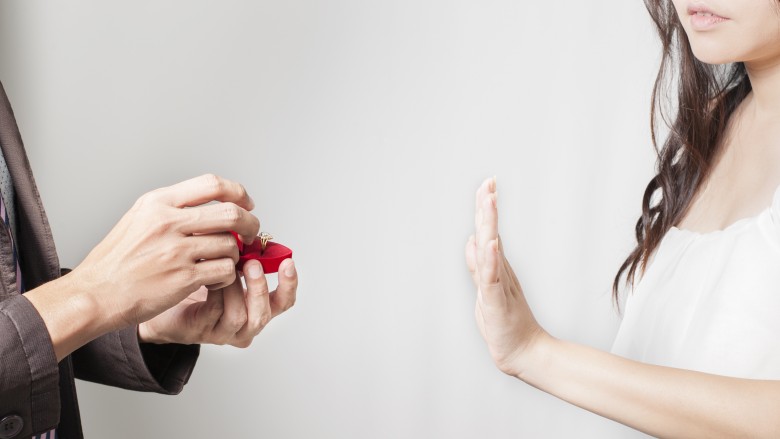The Most Common Bad Advice Given By Relationship Experts
Dating, for most people, can be a daunting enterprise. While some people seem to fall effortlessly in love and establish healthy relationships, many others navigate the world of dating and relationships somewhat tenuously.
In this fraught dating climate, then, it's not surprising that a number of people turn to relationship experts to help them steer through muddy romantic waters. And often it can be safer, emotionally speaking, to rely on professionals who study human coupling for a living, but does trusting them guarantee that you'll get the best outcome? Certainly some professionals have dished out advice that turned out to backfire in the end. Here are some of the most common examples of bad advice that experts give their clients.
Don't go to bed angry
Going to bed angry seems like it belongs in the top five relationship faux pas. But this seemingly ubiquitous advice might not be the best course of action for every situation. Amy Serin, co-founder and Chief Science Officer of The TouchPoint Solution who holds a PhD in clinical psychology, believes otherwise.
She told me, "Never go to bed angry is bad advice because many couples think they need to force themselves to try to resolve problems immediately to get them over with before bedtime. This can backfire because if one or both partners is angry, it's best to not discuss an issue until both partners are calm. Now it's a great thing if people can calm themselves down so they don't go to bed angry, but when this is difficult, it's best to go to bed angry and re-visit the problem at a time when both are calm."
So your mileage may vary. Assess the situation and determine which solution is right for you in the moment.
Always be forgiving
Forgiveness and the propensity to let go of anger is often touted as a virtue, especially in the context of a partnership. If someone is truly sorry, then conventional wisdom tells us to forgive and forget because holding onto the negative feelings will only make things worse. But there are times when forgiving isn't the right thing to do, and can hamper your well-being. Dr. Serin notes that some situations are an exception.
"'You always need to forgive' is bad advice for someone in a relationship who is being emotionally or physically abused. If someone does something that needs forgiving, it may be that the burden of change should be on them, not the person who was hurt."
So while more minor infractions may be worthy of absolution on behalf of the injured party, being repentant does not absolve someone of their abusive behavior. They need to work on themselves before they are deserving of your forgiveness.
Take advice from your therapist
When aspects of our lives feel difficult to navigate alone, it's often a good idea to turn to a therapist for guidance. After all, they are trained and licensed to help us make healthy and informed decisions in our lives. But it's not the job of the therapist to explicitly tell their patient what to do, especially if they don't have established rapport.
Licensed Psychologist Barbara Winter told me that, "The worst advice comes from a new patient seeking advice when there is little if any connection between therapist and patient. For example, I once had a new patient push and push, and in the second or third session, I gave strong advice (for me, at least something like, 'yes you might want to consider . . .'). That was a big mistake, and bad, bad clinical judgment. Not only did it backfire and she stopped treatment abruptly, but I believe she wrote a bad review online. That is a typical example of bad advice. At least it was only once."
Preferably, it's best for the patient to make their own decisions. Dr. Winter continued, "I might advise someone I know really well, so there is an exception to the rule, but it's helpful to have them be empowered to make that decision."
Market yourself
It may seem like stalwart, tried-and-true dating advice that every expert gives, but the idea of marketing yourself aggressively to people may not be the best way to find a good partner. While it's good to dress sharply, be in your best shape, and refine your interests, throwing yourself too deeply into crafting yourself for a partner can be an exercise in futility.
At best, you can find someone deserving of your efforts who appreciates you, but you don't have to constantly reinvent yourself for their benefit. At worst, you could wind up in a partnership that demands this unnecessary physical and emotional labor from you constantly.
So instead of marketing yourself to others, market yourself to yourself. Wear makeup because you like the way it looks. Go to the gym because you enjoy being strong. And wear clothes that make you feel confident and comfortable. You're more likely to attract a deserving partner that way anyhow.
Dates are like job interviews
On the surface, it makes sense to treat a first date (or the first few dates) the same way you would a job interview. In both situations, you're looking for a good fit that benefits both parties mutually, often for the long-term. But heading to your first date with a notebook of pointed questions for your future husband is not the best strategy.
Sexologist and relationship expert Noni Ayana told me there's a better way to handle dating. "My top dating rule is 'date as if you're meeting a new friend, not a potential spouse.' When we are out with friends our defenses are down, our attire fits how we feel and not necessarily how we'd like to be perceived, there is no questioning who will pay, and conversation is likely to be more engaging because there is no pressure to meet expectations," she said. "You may ask your date, 'Why are you single?' while you may ask your friend, 'How does it feel to be single?' The first question may be viewed as you thinking something may be wrong with this person. The second question is more effective, and allows a person to self-reflect, and likely give a more genuine response." So in essence, go with the flow and let the energy of the date move organically.
She continued, "I understand people wanting to get straight to the point, but this society is not the best at effective communication. We rely on superficial characteristics to tell us if a person is worthy of a relationship. I often refer to this strategy as the iceberg effect. We tend to focus on what we can see, and neglect to look underneath the surface."
It's all in your head
Even though it's 2017, apparently advocating for your own sexuality as a woman can be a radical act. As much as institutional wellness counseling benefits millions of people in the United States, some women's issues remain mishandled and/or misdiagnosed.
Noni Ayana told me, "I disagree with how sex therapists tend to pathologize female sexual dysfunction, assuming their issues are more mental as opposed to physiological. Sex therapists are psychologists with a specialty in sexuality. Meaning, in addition to their degrees and certifications within the discipline of psychology or mental health, they met a few additional requirements to become certified as a sex therapist. Unfortunately, medical doctors also receive very little education in regard to sexuality. They too tend to minimize female sexuality."
So don't accept it like dogma when a professional of any stripe tells you your problem is in your head. Interrogate them about their findings, and advocate for yourself as much as possible. Because it's probably not just you.
Closure is essential
Time and time again women are told that in order to process emotional events, we need to find closure. Supposedly this is the one thing that will allow us to heal after a relationship comes to an end. And there are many ways experts tell us we can get closure: grieve, process, create rituals, etc. It's not for everyone, though, and chasing this nebulous emotional healing may have you spinning your wheels.
Erica McCurdy, a certified master coach informed me, "Closure is overused and rarely gives either side the answers and mental rest that the client imagines it will. We often want closure when we have failed to address a situation at the time it took place. Because we have allowed time to pass, we have stewed, anguished, agonized over unimportant issues until they have grown into something much bigger than they ever needed to be."
Her advice? "Drop closure off at the curb, it's not your friend. Pick a new place to hang out and move on."
Marriage or bust
Don't want to get married? Dreading the annual holiday gathering where your entire family asks you why you're still single? You're not alone, and this pressure might be the result of endemic bad advice.
Noni Ayana told me that recently, London blogger Shirley Dee advised women to never date a man for more than a year. "Her advice was in response to a video that recently went viral about a young woman that ended a nine year relationship with the father of her child due to his refusal to marry her. In Shirley's opinion, you only truly get to know your partner once in a legally recognized relationship. She feels that any relationship that has been together for more than one year, and is not seeking marriage, should be reevaluated. She also put a lot of focus on a woman's youth as being a tool to attract a suitable mate."
Ayana disagrees with this perspective. "This is bad advice because it disparages single older women, and women that are dating yet do not want to be married. This type of advice also perpetuates the idea of marriage as being the pinnacle of love-based relationships, and does not consider the many variations of committed relationships that are just as healthy and successful," she said. "I understand her article may have been targeting single women wanting to be married. However, I feel it's important to acknowledge that there are other types of relationship goals that don't include marriage."
Trust family and friends' advice
So what makes someone a relationship expert anyway? Right away, education, certification, and experience come to mind. Professional relationship counselors are often the most logical people to turn to when you need help navigating a sticky relationship situation. But not everyone trusts licensed professionals with their most intimate concerns and struggles. In fact, people often talk to their closest friends and family when they're going through tough times, or figuring out if a relationship is going to last. This might not always be the best course of action, though, as close friends might have problems of their own.
Licensed mental health counselor Daryl Cioffi told me, "I often find that my couples have warped senses of healthy behaviors in their relationships. Some of the worst advice comes from friends and family members because they themselves have unhealthy relationship patterns."
So before you run to your mother or your best friend for words of wisdom, take a good look at their relationships. Are they solid? Do they have happy partnerships? If not, it's probably better to take their advice with a grain of salt. Otherwise you might end up digging deeper into toxic situations. Cioffi also said that "advice like 'Just stay and work it out' when it is a potentially dangerous situation or 'If he/she loved you he would [insert ridiculous thing here]' often keep a marriage or relationship from ever becoming healthy."
Cultivate healthy intuition
Dr. Barbara Winter notes that, "Bad advice from an expert is telling someone exactly what to do: get a divorce, break up, end the relationship, albeit romantic, familial, business, etc." This kind of pointed, instructive guidance, then, should not be heeded from experts, no matter how well-meaning or logical it may sound. Rather, the expert's job is to guide their patient into making healthy, heartfelt decisions on their own.
Dr. Winter continued, "It's not bad advice when we recommend how to best engage, speak, or treat a partner to make a relationship healthier." So learn how to be an active listener who can make the most out of what you're told from professionals. Interrogate a situation and use the wisdom you have to make the best decisions. And listen to your heart.










